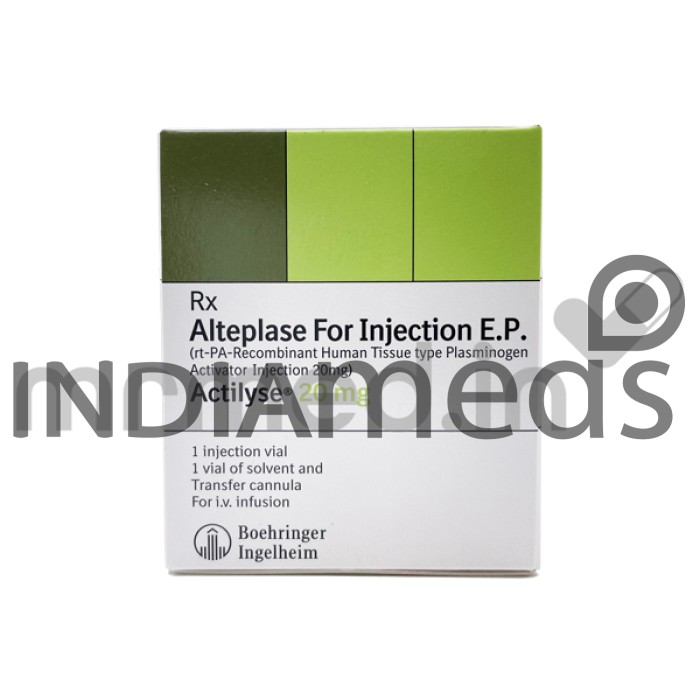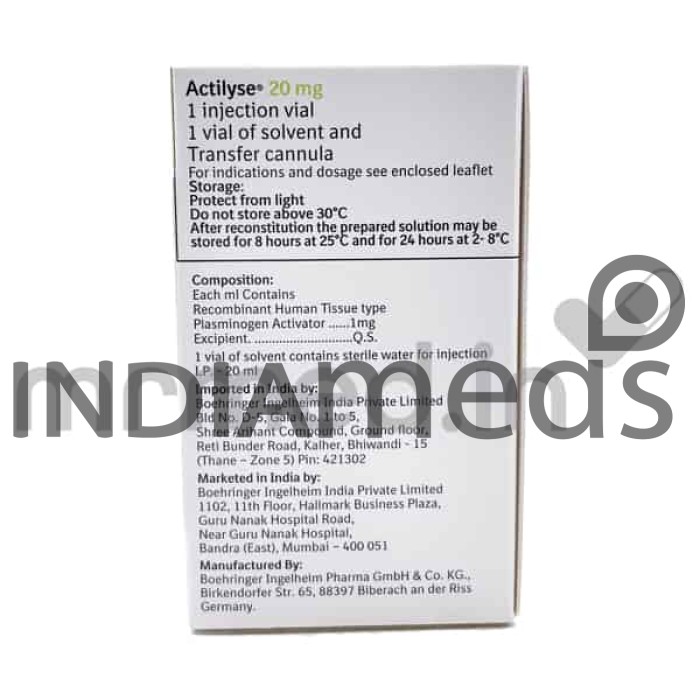Actilyse 20mg injection contains an active component as Alteplase. It is also known as recombinant tissue plasminogen activator (rt-PA), used to treat certain medical conditions involving blood clots. It is a thrombolytic agent, meaning it helps to break down blood clots. This medication is commonly used to manage acute ischemic strokes, where a blood clot blocks blood flow to the brain, leading to potential brain damage. By administering atelpase within a specific time frame after the onset of stroke symptoms, doctors aim to restore blood flow to the affected brain tissue and reduce the risk of long-term disability. By restoring blood flow to the affected brain area, Actilyse 20mg injection can help minimize the extent of brain tissue damage caused by the stroke. This can lead to a reduction in long-term disability and an improved chance of recovery for stroke patients. As with any medication, this medication can have side effects, and it may not be suitable for every patient. Common side effects include bleeding, particularly in the brain or gastrointestinal tract. Before administering it, usually, doctors assess the patient's medical history and consider any contraindications.
Patients who have a known allergy or hypersensitivity to Actilyse 20mg injection or any of its components should not receive this medication. Patients with significant trauma (head trauma or internal injuries) within the past three months due to an increased risk of bleeding should avoid this medication. This medication is cleared from the body through the liver and kidneys, so caution is advised in patients with severe liver or kidney impairment. Advanced age can increase the risk of bleeding complications with this medication, particularly in patients over 75.
- Heart attack
- Acute ischemic stroke
- Acute massive pulmonary embolism (blood clots in the lung)
Therapeutic Effects of Actilyse 20mg Injection
Pregnancy
If a pregnant woman requires treatment with Actilyse 20mg injection, then they should consult a healthcare provider. They will weigh the potential benefits of resolving the critical situation against the potential risks to the developing fetus.
Breast Feeding
If you are breastfeeding, it is essential to consult with a healthcare professional for personalized advice and guidance before starting treatment with ateplase.
Lungs
Using Actilyse 20mg injection for lung-related conditions requires expert medical care and a multidisciplinary approach. It should only be administered in a hospital setting by healthcare professionals experienced in managing such cases.
Liver
Using Actilyse 20mg injection in patients with liver impairment requires consultation with a qualified healthcare professional, who will consider the patient's medical history, liver function, and overall risk profile.
Alcohol
Regarding the safety of Actilyse 20mg injection and alcohol consumption, it is generally recommended to avoid consuming alcohol while taking it. Alcohol can have various effects on the body, potentially affecting the cardiovascular system and increasing the risk of adverse reactions.
Driving
Actilyse 20mg injection can cause certain side effects that may impair your driving ability. These side effects can include dizziness, lightheadedness, blurred vision, and transient changes in heart rhythm. These effects can interfere with your concentration, alertness, and coordination, making driving potentially unsafe.
Serious:
- Bleeding
- Allergic reactions
- Hypotension (low blood pressure)
- Cardiac arrhythmias
- Hypersensitivity reactions
Common:
- Low blood pressure
- Chest pain
- Fluid on the lungs
- Bleeding of the damaged blood vessel
- Bleeding at the injection site
Actilyse 20mg injection is most effective when administered within the recommended time window and in specific cases of acute ischemic stroke, pulmonary embolism, or acute myocardial infarction. Its use must be carefully evaluated on a case-by-case basis by qualified healthcare professionals.
Actilyse 20mg injection is contraindicated in certain conditions, such as active bleeding, recent major surgery, intracranial hemorrhage, known hypersensitivity to it, and other situations with an increased risk of bleeding.
Before administering Actilyse 20mg injection, healthcare professionals typically perform brain imaging (CT or MRI) to rule out hemorrhagic stroke, which is a contraindication for this medication use. They may also conduct blood tests to assess coagulation parameters and ensure that the patient meets the necessary criteria for treatment.
There is no specific reversal agent for Actilyse 20mg injection. In case of severe bleeding complications, healthcare professionals may use supportive measures, blood products, or other interventions to manage bleeding. Close monitoring and immediate medical attention are essential to address any adverse events promptly.
Actilyse 20mg injection is not approved for use in children or adolescents for stroke treatment. Its use in this population is limited to specific cases and requires expert evaluation and consideration of the risks and benefits.
Molecule name: Alteplase | Therapeutic class: Thrombolytic agent |
Pharmacological class: Tissue plasminogen activator (tPA)
| Indications: 1. Heart attack 2. Acute ischemic stroke 3. Acute massive pulmonary embolism |





